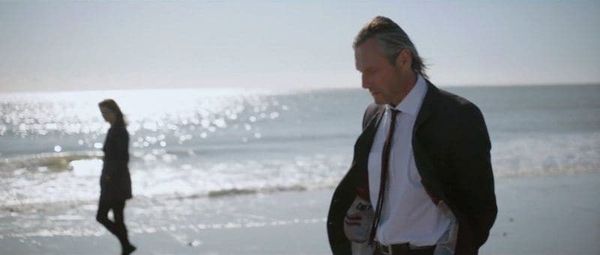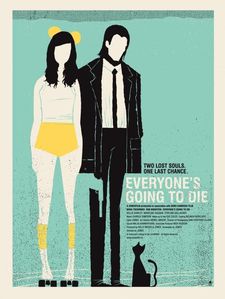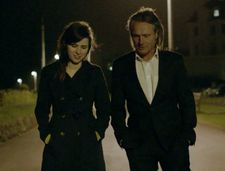 |
| Max Barron: "It's totally about people being lonely. People being lonely is a very real thing - now more than ever" |
In 2013, directorial duo Jones - better known to their mums as Max Barron and Michael Woodward - brought their debut feature film Everyone's Going To Die up to the Edinburgh Film Festival, fast-forward two years and, as this year's festival reaches its final weekend, their blackly comic indie drama is finally reaching cinemas, courtesy of a Kickstarter project (it will be released on VoD on July 6). The title might suggest that it's the latest grim shoot-em up from London but, in fact, it's a quirky off-beat drama between world-weary hitman Ray (Rob Knighton) and a young German emigre (Nora Tschirner).
When I caught up with Barron a couple of weeks ago, I asked him why they picked such an unusual title, given that that might well add to the difficulties of 'selling' it to a distributor.
"The reason behind the title is two-fold really," he said. "Firstly, it's what the film is about. It's about people in a place in their lives where you become a bit aware of the fact that time is not infinite for you. He's certainly become aware of that because his brother has died and life hasn't worked out the way that he wanted. She's at probably the earlier stage of that idea. I think that does happen. It kind of happened to us in our late 20s, early 30s. You lose that sense that the person you're going to end up being is awaiting you in the future somewhere. You realise, I am now an adult and that's just me. So, it's the thing that unites those two characters and makes them the right people for each other.
"We also liked the brutality or starkness of the title. I thought that in cinema reviews when there are five or six films to read a review of, you would probably at least look at the review of that. It catches your eye. I felt like, as soon as you read that review, or a look at the poster, it becomes clear that it's a kind of indie comedy. It's not a gangster/murderer flick or anything like that and the juxtaposition of those two things tells you something about the film. It's sort of a title with a sense of humour.
"But that notwithstanding, from an industry point of view, they're like, 'What if people think it's a horror movie?' and you say, 'Well, unless the only thing they ever experience about it is the title, it'll quickly become very clear that it's not a horror movie.' But what can you say to that?
"If you make those kind of creative decisions based on how am I going to get the biggest number of people into the cinema, it feels like the wrong reason to make it. You have to make it on the thing you want to say and hope the people who get in the cinema and do like it tell people about it.
"I've never made a film before and neither has Mikey so we're learning all the time. But I feel like once you start making decisions like, what's the commercial thing to do? You're just going to lose yourself. Where does that end? The commercial thing to do was probably to make a different film entirely."
In what Barron calls a "sort of backwards thing", the film has already been released in France, Latin America and they also won distribution in the US from a competition called the Manhattan Project, which screens short films and one feature winner a year across the country. But Britain proved a tough nut to crack, so In the end, they have opted to do it themselves - with a little bit of help.
 |
| Barron: ""The amazing thing about Rob is the moment you turn the camera on him, he just is... not himself, but he's totally cool with it." |
Barron explains: "Because the film came out in such an unusual way - in terms of how we funded in and made it - we didn't really have any involvement from anyone in the film industry, other than the crew and us. So having made it, we were going round all these festivals but had no plan of action.
"We met a guy called Dave Shear, who runs a distribution company called Shear entertainment, and he used to be part of Revolver. He's a sort of consultant for people who self-distribute and he loved the movie and when we chatted to him about it we thought that probably fits the ethos of the film to do it that way. It sort of involved going and doing a Kickstarter campaign and asking people to be very generous and help us to do it by committing some money.
"We're never really super-excited to be asking people for money, to be honest, but it felt like the right thing to do and, actually, the Kickstarter thing was amazing. It was a triumph of the human spirit - everyone was so lovely. Not only was that a success because we got the money we were after, it was a really lovey process. We got in touch with a lot of people we hadn't spoken to in a while and, it's funny, people you've never met before find out about it and want to give money, which is brilliant. So now it's really us with a couple of consultant guys who know what they're doing. It's so complicated putting a film out."
The dislocation of the title is an idea that is carried throughout the film, with both the main characters feeling out of step with their surroundings.
"We really love and always wanted to make a film that can somehow deal with some kind of subjects that aren't cheery subjects in a way that's entertaining and has a smile on its face but for that not to cheapen it," says Barron. "The films that we really love are those that hit that kind of sweet spot of being melancholy and giving you something to think about but also make you smile. If you leave the cinema feeling just depressed, even if the movie was brilliant, that, for us, is not as satisfying a feeling as if you've been given something to think about. But you feel better than you did when you went in - and that's where the humour comes in.
"You think, what's the funny way to have this conversation. It's totally about people being lonely. People being lonely is a very real thing - now more than ever. I don't know if I'm qualified to say that because I wasn't around in the 1930s, but it does feel like the people I know, you feel like everyone's a bit isolated in themselves. So in that sense, it's a bit of a modern subject. He's dislocated in time and she's dislocated in place. He was connected to that place and those people but time has really got in the way of it and she has never been and is more connected to somewhere else. So, they're both, well, someone described it as being 'nostalgic for something that never happened', which is a nice way of putting it."
 |
| Barron: "I feel like once you start making decisions like, what's the commercial thing to do? You're just going to lose yourself. Where does that end?" |
Folkstone is also a name that - for those of us of a certain age - is associated with transience. Once a busy ferry port it was hit hard by Eurostar but is now beginning to regenerate and the film shows it in a positive light.
"I love it, it's such a beautiful place, "You know how it sometimes feels like low budget indie films in Britain portray it as kind of a bleak place. They don't romanticise it very much. We wanted to do that and people to be like 'Ooh, where's that, I want to go there'."
Jones themselves were learning as they went along and they also picked an unknown and an up-and-comer to be their stars. Tschirer had been mostly working in her homeland, while Knighton was still plying his trade as a carpet fitter.
"He got picked up, before we found him, as a model - but only at the age of 52," says Barron. "And he was still doing both those things when we met him.
"So Rob was a complete discovery and did an amazing job. In lots of ways. Not least in coming from a regular job and stepping up to it. But also, we've shot quite a few shorter form things with non-actors, as you might say, and the tendency 90 per cent of the time, is that they overdo it. So you're always trying to bring them down and make it a bit realistic because people give you a big performance.
"The amazing thing about Rob is the moment you turn the camera on him, he just is... not himself, but he's totally cool with it. If anything, we're having to draw emotion out of him here and there. If you turn the camera on him and let him just stand there for two or three minutes, it's a really hard thing to do. As a non-actor you get nervous but he doesn't have that, he's really cool and comfortable in his own skin."
The end result is something that would easily slot in alongside American indie filmmakers, but Barron says the market in Britain is totally different.
"We were in a festival with Joe Swanberg... you talk to those guys and the filmmakers have a kind of a community," he says "The lower budget filmmakers who are slightly outside the system maybe, they've managed to create an audience almost by collective mass. If there was just one of those guys, I'm not sure that they would have an audience, but because there's about 20 of them, you can afford to have a couple of misses for every hit and still there's a body of work there.
 |
| Everyone's Going To Die - poster |
"He's doing films all the time and some big studio comes and wants to distribute it. The idea that that would happen in Britain to someone who made a film for 50 grand is totally crazy. We've just got a different market here. I think what you have in Britain is that once you've made a film, you're in a smaller group of people, so there's fewer movies on people's radar so it's easier to get a profile. Whereas in America, you can make a film that everyone loved and did very well within its own community but still made no impact nationally whatsoever.
"The bigger thing here is that it's so difficult. One reason why it hasn't had loads of big distributors wanting to distribute it, is a very sensible financial reason, which is it's a very small film and how do they make money? That's the right answer, I get that. It might also be that they don't like it. One thing there aren't here are a lot of little British movies that have this tonality. If our film had been more social realist and fitted into that. There are brilliant low budget movies getting made and a lot of them fit into that category. If ours did, I think people would be able to picture it a little bit more easily and think, I know there's an audience for this, I've seen these before. By stepping out of that tonality, you make it harder for yourself and I think that's always going to be true.
"You can be smarter, we can get people involved earlier, next time will be a whole different kettle of fish. The great thing, whether you like or don't like what we've done as a piece of work, I think the great thing about doing something that's just the thing that you wanted to do, is that when it stands out from other stuff, audiences love that.
"I know it makes it harder to get large numbers of people into the cinema because the poster doesn't write itself and all that. But the number of people who have come up to us afterwards, one of the main things they like is that it wasn't pigeonhole-able. It's only reinforced our conviction that being in that slot where you're not sort of handing people something on a plate is a really good place to be if you can make the business side of it work and get it out there. I hope it's how it goes down."
However things turn out, it certainly hasn't stopped Barron and Woodward from wanting to work together. In fact, on the day we spoke, Woodward was busy cooking risotto (he's reportedly "quite good at it") for the film's London premiere.
"It's so much better when there's two of you," says Barron. "If something goes wrong, you can ring someone up and they've got exactly the same problem you have. They say a problem shared is a problem halved and it really is that. If anything, it's been a massive reinforcement. If we were to do it again, we would hopefully have a lot more high level involvement from people who can oil the wheels of thing and we won't be pushing the entire thing along ourselves, which we have right through to now...
"Every single thing is you. It's been a brilliant thing to do with your first movie because you get to feel everything really strongly. So when people like it you get to hear about that and when they don't you hear about it, and that's really helpful. I just think you wouldn't want to do that every time, you'd just run out of steam, but having two of us to do it has made it infinitely easier. And I have to say Kelly Broad our producer has been amazing and has been on it right from the start and has been sharing every single decision with us. We've had a little team and we're a tighter unit now than when we started."
This is good news for those of us who enjoy the mix of melancholy and humour that marks out their debut as they're already quite a long way into development with the BFI on their next project, which Barron says has really strengthened the script.
There's a bit of magical realism, there's comedy. If you like the tone of Everyone's Going To Die, this is a film you'd probably like. We're going to start trying to raise the production money soon, so we'll see how that goes but it would be lovely to start shooting it early next year but we'll see how it goes.
"We've got a couple of films in development at the moment but the most likely one to do next would be Firebird," he says. "It's like an extension of some of the tonality of Everyone's Going To Die but slightly bigger in scale. He's a kind of magician in LA but almost immersive theatre. That's his background - he's lost an eye in an accident - and he comes back to England to visit a load of old friends and catch up with him and he finds out that nobody really likes him.
"There's just something much funnier about people having a hard time than there is about people having a nice time because you can make them likeable with it. Life's a bit like that. Mikey and I had a conversation and we said it would be nice to make films where life was the antagonist. So you get people just can't get a break and we all feel a bit like that."
If you want to give Jones a break - and enjoy a good film in the process - Everyone's Going To Die is released in Picturehouse cinemas and the Barbican Centre in London from June 26. For a full list of cinemas so far - or to get together to lobby for screening near you - visit the official site. The film will be available on VoD from July 6 and you can find out more from their Facebook page.






















